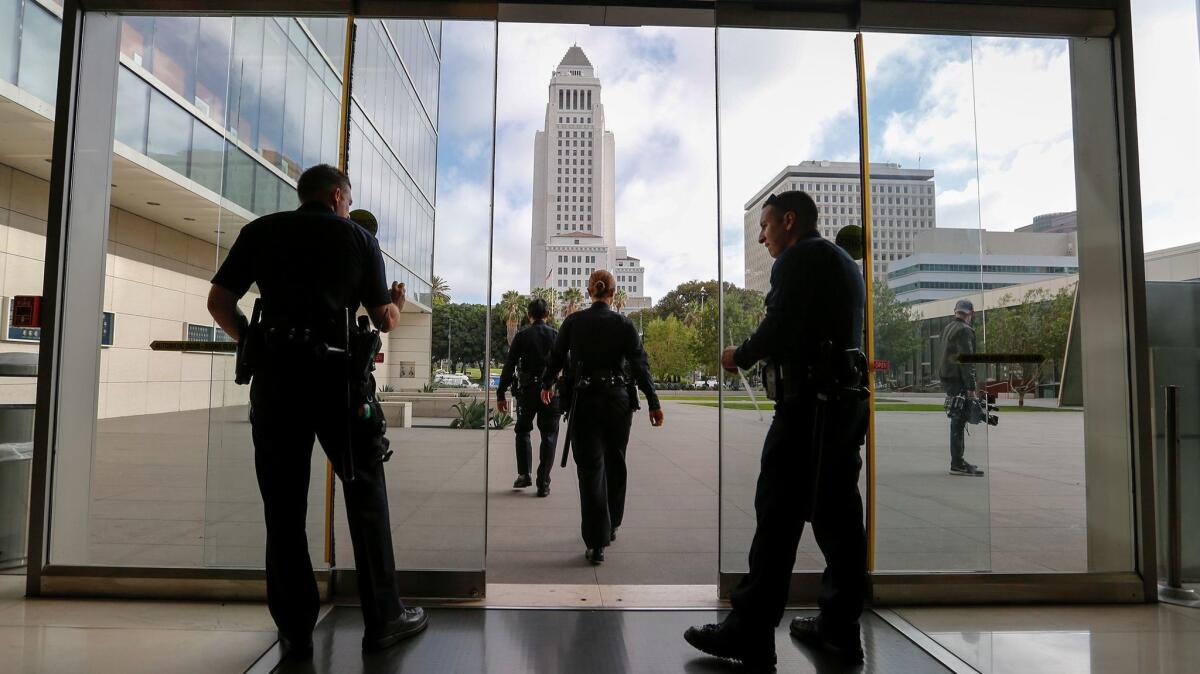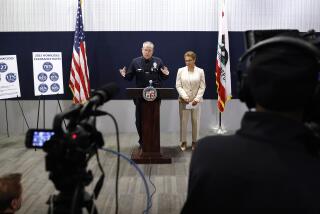ACLU sues LAPD over ‘systemic violation’ of public records law

The American Civil Liberties Union has joined with a journalist, a college professor and an activist to sue the Los Angeles Police Department over what they describe as a “systemic violation” of California’s public records law.
The lawsuit, filed Tuesday, accused the LAPD of failing to comply with the California Public Records Act by not responding to requests within the time frame mandated by the law or by ignoring inquiries altogether.
The civil complaint documents nearly a dozen examples of such requests, including some that were allegedly made years ago and have yet to be answered.
“More and more, police departments throughout the United States acknowledge the value of transparency — to increase public trust, promote better law enforcement, and facilitate effective oversight,” the lawsuit stated. “The LAPD’s pattern and practice of violating the [state’s records act] and ignoring requests for public information is not only unlawful, but also out of step.”
The suit asks the court to compel the LAPD to follow the law and order the department to track — and report publicly — how it responds to public records inquiries for at least three years to ensure it continues to do so.
An LAPD spokesman said the department had no immediate comment Tuesday morning.
Adrienna Wong, an attorney with the ACLU of Southern California, said public records allow residents to evaluate how their law enforcement agencies are performing and look for ways to improve them, and can help improve community trust in police. Access to agency documents is particularly important during this era of increased scrutiny of law enforcement, she said.
“All of that information is really relevant to this public discussion and has real concrete impacts,” she said.
Though commonly used by journalists and advocacy groups such as the ACLU, public information can be requested by anyone under the California Public Records Act.
Once an agency receives a request filed under the Public Records Act, it must respond within 10 days, saying whether it will provide that information. The law allows agencies to make some exceptions if there are “unusual circumstances,” giving them an additional 14 days, at most, to respond.
If an agency determines the information can be released, the law requires it to provide an estimated date and time when that will happen. Once an agency decides records are public, the law states, it must release them “promptly.”
The ACLU filed the lawsuit with three other people: Ali Winston, a journalist whose stories have been published by the Center for Investigative Reporting; Kelly Lytle Hernandez, a UCLA professor known for her work on race, policing and incarceration; and Shawn Nee, a community activist and photographer based in L.A.
The lawsuit cataloged records inquiries made by Winston, Hernandez or Nee that the LAPD failed to respond to by the 10-day or 24-day deadline. In some cases, the lawsuit states, the department never replied.
Such was the case in early 2014, the lawsuit said, when Winston requested records from the LAPD about facial recognition cameras as well as software the department used to target potential criminals. The department didn’t respond to the requests within 10 days, the lawsuit said. Three years later, Winston alleged, it still hasn’t.
Times reporters have also experienced lengthy delays after requesting records from the LAPD, including cases in which the department has not responded within the 10-day window.
Recently, the LAPD’s Discovery Section — which handles such requests — has sent automatic replies that say the processing time for requests is six to eight weeks “due to limited staffing.”
The ACLU filed its own inquiry in November, asking for information about the oldest records requests the LAPD had yet to fulfill and the department’s policies for handling such requests. On the same day, the lawsuit stated, the LAPD responded via email, confirming only that it had received the inquiry.
As of Wednesday, the lawsuit said, the ACLU had heard nothing more.
To read the article in Spanish, click here
ALSO
Wells Fargo investors send ‘message of dissatisfaction’ in narrow board vote
This California university has a vending machine that sells the morning-after pill
More to Read
Start your day right
Sign up for Essential California for news, features and recommendations from the L.A. Times and beyond in your inbox six days a week.
You may occasionally receive promotional content from the Los Angeles Times.







